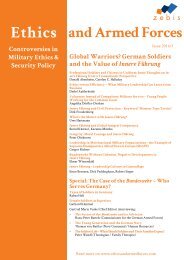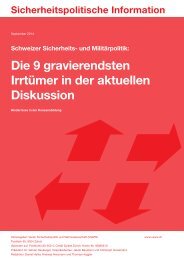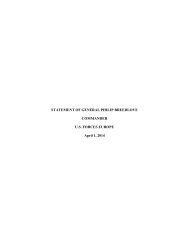FULLTEXT01
FULLTEXT01
FULLTEXT01
Create successful ePaper yourself
Turn your PDF publications into a flip-book with our unique Google optimized e-Paper software.
TACTICAL THOUGHT<br />
2014 September 29 th<br />
Three sub-questions were developed as follows;<br />
Do groupings in thought exist, regarding areas of violence, which have to be<br />
considered in the tactics of Irregular Warfare If so, regarding what areas of<br />
violence<br />
Do groupings in thought exist, which can be linked to a military culture that regards<br />
Regular Warfare tactics to be sufficient even in Irregular Warfare, or is new thinking<br />
needed<br />
What other groupings, regarding similar or different thoughts on tactics in Irregular<br />
Warfare can be derived from the result<br />
The investigation was conducted using a qualitative and quantitative analysis of a<br />
collection of open-ended questions on the phenomenon of Irregular Warfare and tactics<br />
in general, and ten questions based on the empirical generalization from the literature<br />
study. Thirty-two people answered the survey with an equal amount of responses from<br />
students and teachers, mostly majors or lieutenant colonels. Twenty-one belonged to the<br />
army, six to the air force, one to the navy, three to the amphibious units and one to the<br />
Special Forces.<br />
Most of them had backgrounds in operations and had mainly been serving in field units<br />
or staffs. Over 60 % had been assigned on at least one international operation and of<br />
these; almost 20% had participated in more than three operations. Still, there was rather<br />
a large amount (almost 40 %) that had no international experience at all. Regarding selfassessment<br />
of personal knowledge and understanding of Irregular Warfare; mainly a<br />
limited knowledge and level of understanding was assessed by 56%. 31 % viewed<br />
themselves to have a limited level of theoretical knowledge and understanding of<br />
Irregular Warfare.<br />
Only about 10 % assessed themselves to have deep knowledge and extensive<br />
experience. Regarding the view of usefulness of the empirical generalizing, 75% of the<br />
officers mainly agreed to the way the empirical generalization descriptions of traits of<br />
Irregular Warfare and how differences compared to Regular Warfare are explained. 25<br />
% partially disagreed.<br />
70% of the respondents agreed with the often addressed opinion on difficulties to<br />
communicate due to limited precision in language and symbols related to Irregular<br />
Warfare, enhancing risks for misunderstanding and also unconscious thinking in<br />
“regular terms”. Concerning the violence spectrum in Irregular Warfare, the officers in<br />
general mainly or fully agreed (37, 5 % for each alternative) that one trait in Irregular<br />
Warfare is a broadened violence spectrum that has to be understood and handled.<br />
Subsequently, over 50% fully agreed and over 34% mainly agreed that the roles of the<br />
military and the police have to be developed if Irregular Warfare is to be possible to be<br />
fought successfully.<br />
49





